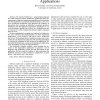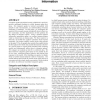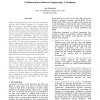119 search results - page 19 / 24 » Understanding and evaluating cooperative games |
INFOCOM
2012
IEEE
11 years 10 months ago
2012
IEEE
Abstract—BitTorrent has been the most popular P2P (Peer-toPeer) paradigm during recent years. Built upon great intuition, the piece-selection and neighbor-selection modules roote...
TSE
2011
13 years 2 months ago
2011
— We present Bristlecone, a programming language for robust software systems. Bristlecone applications have two components: a high-level organization specification that describe...
ATAL
2008
Springer
13 years 9 months ago
2008
Springer
Computer agents participate in many collaborative and competitive multiagent domains in which humans make decisions. For computer agents to interact successfully with people in su...
EJWCN
2010
13 years 2 months ago
2010
We formulate the problem of distributed throughput-efficient sensing in cognitive radio (CR) networks as a dynamic coalition formation game based on a Markovian model. The propose...
ICSE
2007
IEEE-ACM
14 years 7 months ago
2007
IEEE-ACM
Software engineering projects are inherently cooperative, requiring many software engineers to coordinate their efforts to produce a large software system. Integral to this effort...



